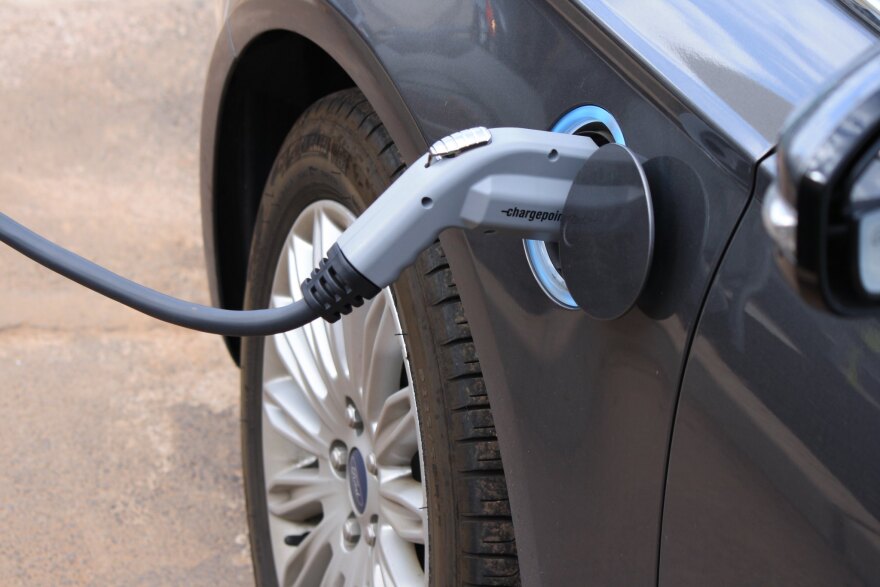A health-focused commission on reducing New Hampshire’s greenhouse gas emissions has finished its work with one recommendation: for the state Legislature to do more formal study of the issue next year.
The Ad Hoc Emissions Commission’s final report, released Thursday, supports the re-introduction of a bill that led the group to form in the first place, after it was tabled during the abbreviated 2020 legislative session.
The bill, co-sponsored by Republican Sen. Jeb Bradley and Democratic Sen. Tom Sherman, would have lawmakers study “science-based emissions reduction goals for the state.”
The ad-hoc group has talked about that for several months, hearing from public health and climate change experts on the financial and health costs of rising emissions.
‘A Sense of Desperation’
The group’s goal was to recommend emission reduction goals for 2030, 2040 and 2050, as well as policy and administrative solutions the Legislature could enact to achieve those targets.
“New Hampshire emissions have fallen markedly since they peaked in 2005, but they are projected to remain at current levels through 2030 absent new policies,” the commission wrote in its final report. “[T]he electric sector [represented] almost 90% of total reductions… principally driven by investments in other New England states.”
Emissions sources such as transportation and home heating are more entrenched, and have a disproportionately harmful effect on communities of color and lower income.
But in the end, the broadly inclusive commission couldn’t agree on detailed proposals for tackling those problems or any others, beyond the recommendation for further legislative study.
"New Hampshire emissions ... are projected to remain at current levels through 2030 absent new policies."
“It’s difficult, because there are those who feel a certain sense of desperation, and I am one of those,” said Sen. David Watters, a Democrat, during the group’s final meeting Thursday. “Then there is the kind of important caution, as to, well, how do we do what we think we need to do?”
Some Net-Zero Consensus
A few group members, including the New Hampshire Public Health Association and the local Nature Conservancy, filed comments supporting a goal of net zero emissions by 2050.
“The direct public health effects associated with climate issues are a primary and immediate concern of healthcare and public health professionals in our state,” the Public Health Association wrote. “It is critical to note that these ill-health effects will disproportionately be experienced by children, the elderly, the sick and lower income individuals.”
The commission report notes that all other New England states have a 2050 emissions reduction target of at least 80% below the levels of 2001 or earlier.
“The [United Nations Intergovernmental Panel on Climate Change] recommends limiting global warming to 1.5?C (2.7?F),” the commission wrote. “There is a high probability that this goal can be achieved if global greenhouse gas emissions are reduced … to net-zero by 2050.”
The Paris Climate Accords also aim to cap warming at 1.5?C. President-Elect Joe Biden has pledged to recommit the U.S. to that global agreement once he takes office.
Industry Concerns Persist
The New Hampshire commission was notable for its bipartisanship and inclusion of representatives from utilities, Gov. Chris Sununu’s office, and industry groups like the state auto dealers organization and the Business and Industry Association.
In its comments for the report, the BIA said it supported the re-introduction of the study committee bill but hoped future rounds of testimony would have a different economic focus.

“While this ad hoc commission heard about health impacts and severity of the effects of climate change, at no point did we discuss the costs associated with reaching target emissions goals, which will be borne by ratepayers including residential customers, [vehicle and commercial property owners] and manufacturers,” the BIA wrote. “A thorough cost-benefit analysis should be a prerequisite for any state strategy to address climate change.”
These concerns are exacerbated by the pandemic and its effects on the economy. This has recently borne out in a debate at the Public Utilities Commission about the future of ratepayer-funded energy efficiency savings programs in New Hampshire.
The BIA, as well as some House Republicans and public commenters, want those efforts and associated rate hikes – projected to be very small for all but the largest businesses – put on hold as the economy recovers.
Most other stakeholders, including some House Democrats, municipalities and all those officially involved in the PUC docket besides commission staff, have disagreed, saying the programs will save ratepayers more than they cost. The PUC continues hearings on the issue next week.
This could foreshadow debates to come in the incoming Republican-controlled Legislature, where some early bill filings signal opposition to funding for many new and existing emissions-cutting measures.
Bradley and Sherman say they will reintroduce the emissions reduction study committee bill in the coming session.








